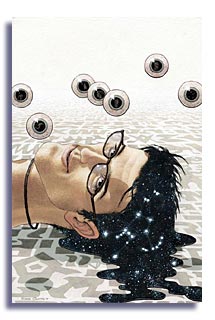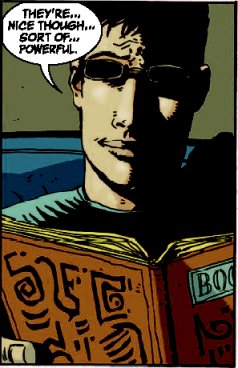Poor Tim Hunter. For years, he has had to struggle, unfairly,
in the shadow of his literary doppelganger Harry Potter.
Fans of either fixated on their similarities, which admittedly
were once startling, but failed to notice just how different
the characters are - and how different their directions
could be.
Leave it to Tim's creator, Neil Gaiman, to prod another
writer, Si Spencer, into pushing the limits and changing
the spelling of Tim's title, too. With its subtitle evocative
of ordinary folk just trying to get by during a period of
chaos, the story is anything but ordinary.
Opening on a battlefield, the caption boxes immediately
tip us off that something is wrong. The soldiers are starving,
eating their dead but also feeding off of centaur meat.
Clearly, the siege on this otherworldly castle has gone
too long. It should come as no surprise that the officer
ordering soldiers killed for minor infractions (thus providing
fresh meat for the others) turns out to be John Constantine.
And yet it's still a surprise, because this can't quite
be the Constantine we know. For he is smack dab in the middle
of faerie, with the slightest of nods toward Fables,
and has been there for fifteen years. The war over magicks
has gotten out of hand, and only one young man can save
them all: the greatest wizard in all the lands.
Unfortunately, he has been hidden, and Constantine had
something to do with it. Not just Constantine, actually,
for Zatanna pops up here, too, and it's possible other somewhat
familiar supernatural characters will weave in and out of
the series. But how could this have been going on for fifteen
years, and where is Tim anyway?
The answer is brilliant and provocative, leaving no doubt
as to why the supernatural world cannot find him. It also
has the effect of a time anomaly in an episode of Star
Trek; Spencer gives in to trying to explain something
that dissipates the closer you look at it. Still, it's the
last place even the reader would think of looking.
It's been a while since I read The Books of Magic,
so I don't know if any of this fits in with how the previous
series ended. Thankfully, it doesn't matter. Spencer has
created a situation so immediate that you don't have time
to ponder where it might fit in Vertigo continuity, if there
even is such a thing. Even the presence of Constantine partially
defies questioning; if there's crap going on in other planes
of existence, chances are Constantine is involved. If you
go back to the first Books of Magic mini-series,
you'd note that Gaiman considers him an eternal trickster
type.
But it's both a strength and a weakness, because Constantine
here seems at odds with his surroundings. It's hard to make
a case for how easily he has ascended to magical military
power. Spencer could have just as easily created a new character,
and we could have possibly bought it.
Artist Dean Ormston also seems a little out of place.
His work has a rough and scratchy look, intentionally exposing
the ugliness of faerie. But it also leaves little room for
a sense of wonderment and maybe even awe; the deliberate
primitivism is too distracting. In some places, the dark
forces gathering seem no less malevolent than the human
friends of Tim Hunter themselves.
Still, this first issue drops enough complex ideas to
have me hooked. Once and for all, it should clearly prove
that Tim Hunter and that other glasses-wearing boy wizard
are separated by far more than an age difference. Tim can
go anywhere, and Life During Wartime aims to take
him to exactly that destination.







